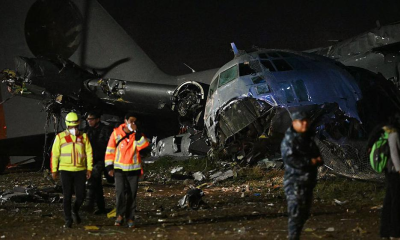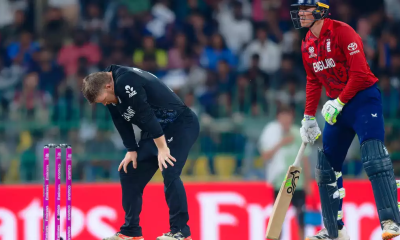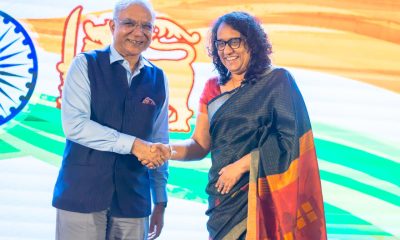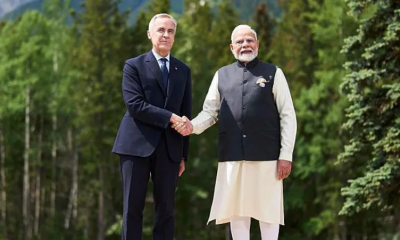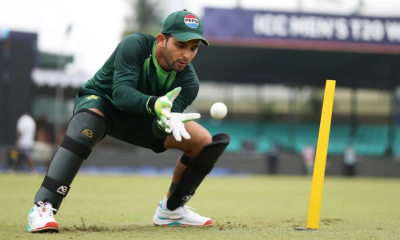News
President announces PAYE tax reductions
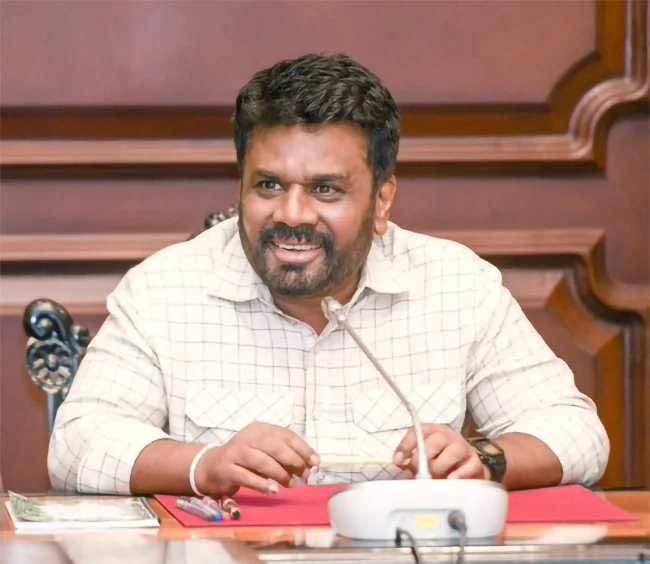
Imputed rental tax to be implemented in 2025
Withholding tax increased from 5% to 10%
President Anura Kumara Dissanayake yesterday told Parliament that the PAYE tax threshold be increased from Rs. 100,000 to Rs. 150,000.
“We held discussions with the IMF and were able to raise the tax threshold from Rs. 100,000 to Rs. 150,000 per month,” President Dissanayake said.
President Dissanayake said that the Withholding Tax would be increased from 5% to 10% and tax on services exports would be reduced to 15% from 30%.
The President said: “During the initiation of the third review, we decided to reduce the burden of the Pay-As-You-Earn (PAYE) tax imposed on professionals in our country. There was significant dissatisfaction regarding this tax among professionals such as university academics, doctors, and bank officials.
Following discussions, we were able to increase the tax-free threshold from LKR 100,000 to LKR 150,000. Additionally, the first band of the Personal Income Tax (PIT), taxed at 6%, was extended from LKR 600,000 to LKR 01 million. Accordingly:
• An individual earning a monthly income of LKR 150,000 pays zero tax.
• An individual earning LKR 200,000 is exempted from 71% of the tax they would have otherwise paid.
• An individual earning LKR 250,000 is exempted from 61% of the tax.
• An individual earning LKR 300,000 is exempted from 47% of the tax.
• An individual earning LKR 350,000 is exempted from 25.5% of the tax.
What does this mean? We have successfully provided greater relief to lower-income earners while offering reduced benefits to higher-income earners, achieving a fair and balanced outcome through this review.”
“Immediately after the conclusion of the general election, on 16 Nov., we began the third review discussions with the IMF. During the second review, several preconditions and agreements were reached by the previous government. One such agreement was the imposition of an imputed rental income tax, which is scheduled to be implemented in 2025, as agreed upon during the second review,” the President said, adding that vehicle imports would resume on 01 Feb. 2025, and that would be carried out under a structured programme.
The President said the government would resume vehicle imports in three stages.
The import of buses used for passenger transport and vehicles used for special services had begun on 14 Dec., 2024, he said, stressing that Sri Lanka would not face a foreign exchange crisis due to this decision.
“Through lengthy discussions with the Central Bank, the government has estimated the amount of dollars that would be spent due to the importing of vehicles and the impact on the economy. In order to strengthen our economy, we must reopen vehicle imports,” he added.
The President said the suspension of the parate execution law had been extended until March 2025.
The law was previously set to remain suspended until 15 December, 2025, following a conditional approval of the Committee on Public Finance (COPF) under the previous Government.
President Dissanayake said the decision to extend the suspension of parate executions by three and a half months had been made following concerns raised by Sri Lanka’s banks, regulators, and small and medium enterprises (SMEs) about challenges in loan repayment and the impact of the law on struggling businesses.
However, he cautioned that such action could have an adverse impact on banks and financial institutions, stressing the need to balance support for SMEs while protecting the banking system.
President Dissanayake said that the total outstanding debt currently stands at Rs. 1,385 billion, involving 752,886 debtors. Of these, 99% are defaulters with loans of less than Rs. 25 million, he said.
“Defaulters who have loans below Rs. 25 million will be given an opportunity to restructure their debt until 12 December, 2025. They must present a debt restructuring plan to their banks by March,” the President said.
News
“We welcome investors and tourists visiting Sri Lanka who contribute to strengthening economic and cultural ties”– PM

Prime Minister Dr. Harini Amarasuriya stated that as Sri Lanka moves towards sustainable growth, the country welcomes investors and tourists who contribute to strengthening economic and cultural ties.
She made these remarks while addressing a special celebration and dinner reception organized by the Sri Lanka India Society to commemorate the 77th Republic Day of India and the 78th Independence Day of Sri Lanka, held on Thursday [February 26] at the Taj Samudra Hotel in Colombo.
During the event, the official magazine of the Sri Lanka India Society was launched, and the book “Port of Call” was presented to the Prime Minister and the Indian High Commissioner.
Addressing the gathering, Prime Minister Dr. Harini Amarasuriya noted that the Sri Lanka India Society since its establishment in 1949 has contributed to strengthening relations between the two nations, through cultural engagement, dialogue, and sustained interaction. The Society has supported ties not only between the two governments but also between the peoples of both countries.
She further stated,
“Over the past year, the strength of India–Sri Lanka bilateral relations has been evident. I express gratitude for the support extended by the Indian government in facilitating the exposition of the sacred Devnimori relics in Sri Lanka.
When Cyclone Dithva affected Sri Lanka, India responded promptly through “Operation Sagar Bandhu,” providing assistance in the rescue and relief efforts.
I appreciated the announcement of a long-term relief package amounting to USD 454 million in support of Sri Lanka’s recovery efforts. India continues to work closely with Sri Lanka in its journey towards sustainable development.
The Sri Lanka–India partnership spans multiple sectors, including economic development, energy, connectivity, trade and investment, digital transformation, health, education, maritime security, and people-to-people ties.
As Sri Lanka progresses towards sustainable growth, we welcome increased investments from Indian businesses and greater tourist arrivals from India, while further strengthening our economic and cultural ties”.
She reaffirmed that India is Sri Lanka’s closest neighbour and an important partner, Sri Lanka is committed to advancing cooperation for the benefit of the people of both countries and the wider region.
Speaking at the event, Indian High Commissioner Santosh Jha stated that the relationship between the two countries goes beyond formal diplomacy and is a strong and special partnership. He noted that the introduction of the first international degree offered outside India in Sri Lanka marked a new chapter in educational cooperation. He also highlighted the continued expansion of collaboration in connectivity and people-to-people relations, adding that India–Sri Lanka relations are experiencing significant growth in the current period.
The event was attended by ambassadors, diplomats, officials of the Indian High Commission, and government representatives.
[Prime Minister’s Media Division]
News
Chief Sanghanayaka of Sabaragamuwa Province felicitated

The “Gauravabhinandana” ceremonial felicitation was held in honour of the Chief Sanghanayake of the Sabaragamuwa Province of the Malwathu Maha Vihara Chapter of the Maha Vihara tradition of the Siyamopali Maha Nikaya; former Pirivena Examiner; Rajakiya Pandith; holder of Master; Scholar of classical texts; recipient of the Kala Bhushana title; Vinaya Keerthi Sri Dhammdinna Saranapala; the Most Venerable Kaeligama Vijithananda Nayaka Thero on Wednesday [25th of February] at the auditorium of the Rathnapura District Secretariat
The event was organized under the patronage of the Anunayake of the Malwathu Chapter of the Siyamopali Maha Nikaya, Most Venerable Acharya Agga Maha Panditha Niyangoda Dharmakeerthi Sri Sangharakkhitha Vijithasiri Abhidhana Anunayake Thero.
The presentation of the symbolic casket to the Most Venerable Kaeligama Vijithananda Nayaka Thero took place with the participation of Prime Minister Dr. Harini Amarasuriya and the Governor of Sabaragamuwa Province, Ms. Champa Janaki Rajaratne.
Addressing the gathering, the Prime Minister stated:
“It is a privilege for me to participate in this felicitation ceremony held in appreciation of the religious and social service rendered by the Chief Sanghanayaka of the Sabaragamuwa Province, Most Venerable Kaeligama Vijithananda Nayaka Thera.
When we reflect on his life journey, it serves as a profound inspiration to us all. Having entered monastic life as a disciple of the Sabaragamuwa prelate, the late Most Venerable Kelle Sri Saranananda Thero, the Nayaka Thera has now rendered over five decades of distinguished service following higher ordination.
After obtaining a Bachelor of Arts degree from the Vidyodaya University, he devoted several decades as a Pirivena teacher and examiner, enlightening thousands of students. He has also authored numerous scholarly works. His classical literary contributions, especially for students of Pirivena education, are of exceptional value”.
The Prime Minister further recalled with gratitude the commitment shown by the Nayaka Thera, centred around the Ratnapura Mahawala Sri Dharmayathana, to uplift the spiritual and social well-being of the local community, and extended her wishes for good health and long life for the continuation of his invaluable service to the Buddha Sasana.
The occasion was also graced by the presence of Most Venerable Karagoda Uyangoda Maithreemurthi Thera, Supreme Mahanayaka of the Sri Lanka Amarapura Maha Sangha Sabha; the Anunayaka of the Sri Lanka Ramanna Maha Nikaya, Waleboda Gnanissara Thera; Lecturer of the University of Peradeniya and Deputy Registrar of the Malwathu Chapter, Panditha Mahawela Dhammakkhanda Rathanapala Thera; the Chief Sanghanayaka of Ratnapura and Uva Wellassa and former Vice-Chancellor of Uva Wellassa University, Bethgamuwa Dhammadinna Thera; along with members of the Maha Sangha. The occasion was also attended by the Minister of Buddhasasana, Religious and Cultural Affairs Sunil Senavi, Governor of Sabaragamuwa Province, Ms. Champa Janaki Rajaratne, Member of Parliament Shantha Padmakumara, former Members of Parliament A. A. Wijethunga and Janaka Wakkumbura, Ratnapura District Secretary Chinthana Udaya Nanayakkara, Basnayake Nilame of the Maha Saman Devalaya Ishan Sanka Mapitigama, Mayor of Ratnapura Indrajith Katugampala, and many other distinguished invitees.



[Prime Minister’s Media Division]
News
Sajith raises fresh concerns over toxic pollutants emanating from burning of substandard coal

Opposition and SJB Leader Sajith Premadasa yesterday raised serious concerns over the Government’s importation of substandard coal, warning that its use has resulted in inefficient electricity generation, increased equipment damage and significant financial losses to the State and consumers.
In a video statement, the Opposition Leader said the SJB had exposed details regarding the importation of inferior-quality coal, prompting what he described as an admission by Government representatives that the coal in question was of poor standard.
Premadasa charged that the continued use of such coal has reduced generation efficiency at the Norochcholai Power Station, while increasing the likelihood of damage to critical equipment.
He further claimed that ash content had risen sharply, from the accepted 11–15 percent range, to over 21 percent, doubling the volume of toxic pollutants generated. The disposal of the excess ash, he said, poses additional environmental risks.
The Opposition Leader also noted that a further 15 to 16 coal shipments are expected to arrive within the next two to three months. However, he alleged that the failure to procure high-quality coal has reduced megawatt output, necessitating greater reliance on fuel-powered plants to bridge the shortfall.
“This results in financial losses to the country, the Government, and, ultimately, to electricity consumers,” he said.
Premadasa cited Section 30 of the Electricity Act of 2009, maintaining that consumer tariffs can only be imposed, based on efficient electricity generation. He urged the Public Utilities Commission of Sri Lanka to safeguard the rights of the country’s 7.5 million electricity consumers, insisting that losses stemming from inefficient generation cannot lawfully be passed on to the public.
He further alleged that the Government’s promised “system change” had, instead, resulted in questionable coal procurement deals. The financial losses incurred through, what he termed, corrupt transactions, he argued, could have been channelled into essential public services, such as education, healthcare, poverty relief and support for entrepreneurs.
Premadasa called not for the appointment of a committee of experts, but for a full forensic audit into the transactions surrounding the coal imports.
He stressed that the SJB would continue to stand in defence of electricity consumers and asserted that the President and Cabinet must accept responsibility for the damage allegedly caused to the Norochcholai power plant, which, he described, as a national asset.
-

 Features6 days ago
Features6 days agoWhy does the state threaten Its people with yet another anti-terror law?
-

 Features6 days ago
Features6 days agoReconciliation, Mood of the Nation and the NPP Government
-

 Features6 days ago
Features6 days agoVictor Melder turns 90: Railwayman and bibliophile extraordinary
-

 Features5 days ago
Features5 days agoLOVEABLE BUT LETHAL: When four-legged stars remind us of a silent killer
-

 Features6 days ago
Features6 days agoVictor, the Friend of the Foreign Press
-

 Business5 days ago
Business5 days agoSeeing is believing – the silent scale behind SriLankan’s ground operation
-

 Business5 days ago
Business5 days agoBathiya & Santhush make a strategic bet on Colombo
-

 Features6 days ago
Features6 days agoBarking up the wrong tree




